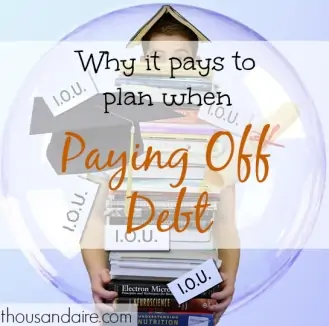Debt is like that toxic friend you’ve had for as long as you can remember; you know the situation needs to be addressed, but you put if off because the process will be unpleasant. However, with friends and finances, waiting until the situation refuses to be ignored can lead to catastrophic – and unnecessary – consequences.
Get over it
Often, the shame or embarrassment we feel about debt can hinder efforts to bring it under control. It’s easy to see why – for the most part, people who are prone to casual mention of a debt situation are those who want you to know they don’t have one.
If you are ashamed of your debt, it’s time to get over it. How you got there is irrelevant – once you have it, a student loan and a credit card balance are both negative lines in your net worth calculation. Face the facts and forget about what anyone else thinks – there is nothing to be gained there.
Turn off the faucet
If you find yourself spending on credit cards, figure out why. Write down all of your expenses for three months, both credit and cash. Then cross out the ones you could have lived without. If the resulting total exceeds your monthly income, cross out some more. Then use this information to build a budget going forward.
Finally, and this is the important part. TAKE YOUR CREDIT CARDS OUT OF YOUR WALLET. This simple advice saved me thousands of dollars at a time when I needed to get my spending under control. Freeze the cards in a cup of water, give them to your mother for safekeeping, or cut them up – it doesn’t matter.
Make your plan realistic
If you’re reading this, you probably love a good “get out of debt” story as much as I do. It’s easy to find examples of folks who tightened their belts, lived on beans and rice, and proudly and inspirationally detailed their experiences on the Internet. And really – my hat is off to them.
But it’s important to know yourself. Just as in managing, cash, understanding what will work for you is paramount to successful debt management. That’s not to say there won’t be sacrifices, but severely restricting your spending all at once is like extreme dieting. It feels like progress for a while, but for most of us it leads to a binge that could make all your efforts for naught.
Redefine the process
If you’re having trouble facing your debt, redefine it. Although debt is often the consequence of spending, paying it off actually belongs on the savings side. Putting aside the recommended 20% of income each month becomes easier if you count your extra debt payments as savings.
Think of your savings as a large bucket. Now imagine that someone cut out the bottom of the bucket and placed it on top of a large hole. Any money you try to put into the bucket will be swallowed by the hole. In order to start filling the bucket, you must first fill in the hole.
The reason that I like this analogy is that it allows you to plan for the long term. Rather than viewing paying off your debt as an isolated, overwhelming task, incorporate it into your long-term picture. Once the debt is paid, the money going to debt can be redirected toward savings goals.
Give yourself the best chance of long-term success
Of course, not all of your 20% savings should be going to debt, no matter how dire your situation. The best intentions in the world won’t help if you have to pull out your credit cards for an unexpected expense. Before you really dig into your debt, put aside at least $1000 for emergencies. If you have to tap into it, redirect your extra debt payments until you build it back up.
Also, you should always contribute at least a little bit to your retirement accounts, especially if you have an employer match. Once your debt is paid and you begin to redirect that monthly allocation, you can increase your contributions and try to make up any ground you lost filling in the holes.
Powered by Linky Tools
Click here to enter your link and view this Linky Tools list…

